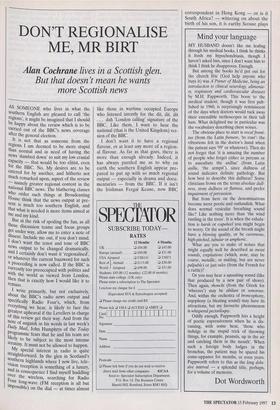Mind your language
MY HUSBAND doesn't like me leafing through his medical books. I think he thinks it feeds my hypochondriasis, though I haven't asked him, since I don't want him to think I think he disapproves. Enough.
But among the books he'd put out for the church fete (God help anyone who buys it) was A Primer of Medicine, being an introduction to clinical neurology, alimenta- ry, respiratory and cardiovascular diseases by M.H. Pappworth. This boon to the medical student, though it was first pub- lished in 1960, is surprisingly reminiscent of the days when doctors would tuck away their extendible stethoscopes in their tall hats. What delighted me in particular was the vocabulary describing chest noises.
The obvious place to start is vocal fremi- tus (from the Latin fremere, `to roar': the vibrations felt in the doctor's hand when the patient says '99' or whatever). Then do not forget that 'it is amazing the number of people who forget either to percuss or to auscultate the axillae' (from Latin axilla, 'the armpit'), since dullness of sound indicates definite pathology. But how best to describe this dullness? Some clinicians frown on the terms absolute dull- ness, stony dullness or flatness, and prefer impairment of percussion.
But from here on the denominations become more poetic and outlandish. What does normal vesicular breathing sound like? Like nothing more than 'the wind rustling in the trees'. It is when the exhala- tion is harsh or cogwheel you might begin to worry. Or the sound of the breath might have a blowing quality, or be cavernous, high-pitched, tubular or amphoric.
What are you to make of noises that might equally well be described as moist sounds, crepitations (which, note, may be coarse, metallic, or tinkling, but are never palpable) or just tales (from the French for a rattle)?
Or you may hear a squeaking sound (like that produced by a new pair of shoes). Then again, rhonchi (from the Greek for wheezes') may be sibilant or sonorous. And, within the orchestra of broncophony, aegophony (a bleating sound) may have its attractions, but my favourite phenomenon is whispered pectoriloquy.
Oddly enough, Pappworth hits a height of poetic expressiveness when he is dis- cussing, with some heat, 'those who indulge in the stupid trick of throwing things, for example, peanuts, up in the air and catching them in the mouth'. When such a foreign body lodges in the bronchus, the patient may be spared his come-uppance for months, or even years. Pappworth refers to this as the long delu- sive interval — a splendid title, perhaps, for a volume of memoirs.
Dot Wordsworth


























































 Previous page
Previous page